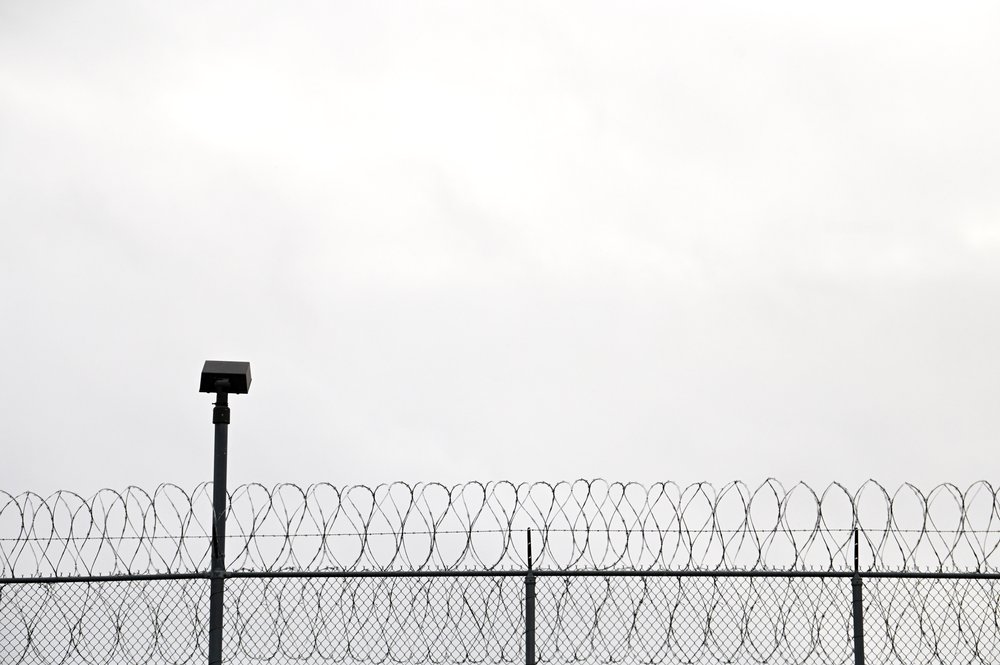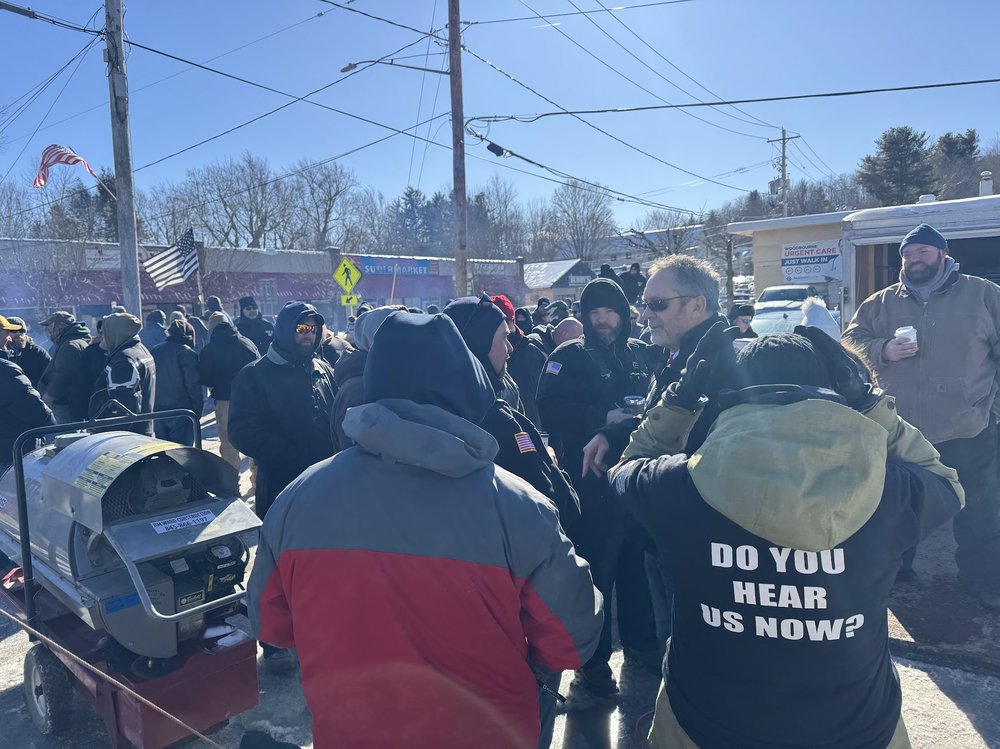Incarcerated men describe deteriorating conditions as unlawful NY prison strikes drag on
Feb. 21, 2025, 5:32 p.m.
Men imprisoned at Woodbourne Correctional Facility said they had been denied hot meals and confined to their cells.

This was supposed to be Michael Vasquez’s last month in prison. But since officers walked out of the Woodbourne Correctional Facility this week, Vasquez is worried that after seven years behind bars, he won’t be released as scheduled.
“It makes me angry, but at the same time it makes me fearful,” Vasquez told Gothamist in a phone interview on Friday, hours after phone access was restored to people incarcerated at Woodbourne. “Because if they're gonna hold me here, what is not to say if one day they say, ‘No we're not letting you go, you gotta wait until this whole thing is over.’”
Current and retired corrections officers continued to demonstrate on Friday outside dozens of state prisons — including Woodbourne, which is about 100 miles north of Manhattan in Sullivan County. Under New York’s Taylor Law, state employees are not allowed to strike, rendering the actions illegal.
The officers began the wildcat strike over objections to rising rates of violence, routine understaffing and a state law that is meant to restrict the use of solitary confinement. The walkouts are also occurring as the statewide prison system faces increased public scrutiny in the wake of the death of Robert Brooks, whom staff at the Marcy Correctional Facility fatally beat in December
Vasquez and Christian Palencia, another man incarcerated at Woodbourne, said their facility was on lockdown for 72 hours, leaving prisoners confined to their cells and unable to eat hot meals or buy goods at the commissary. The only foods served in the middle of the week were cereal, bread and bologna.
Democratic Gov. Kathy Hochul deployed National Guard personnel and suspended visitation across the state’s network of 42 prisons. Guard troops are now visible in the prison, but they aren’t interacting with prisoners, the men said.
“It's stressful because you don't know – anything could change,” Palencia said. When prison officials restored access to phones on Friday, he called a friend who connected the call to Gothamist.
A spokesperson for the Department of Corrections and Community Supervision, which oversees the state’s prison and parole system, didn’t respond to questions about the men’s description of conditions at Woodbourne.

As incarcerated people report deteriorating conditions because of the walkouts, the guards protesting outside have voiced several grievances of their own. In interviews with public media, many of the strikers blamed the problems on the 2021 HALT Solitary law, which limits the amount of time a person can be held in solitary confinement and requires due process before a commitment can begin. It also mandates that any incarcerated individual be allowed at least four hours out of their cells each day and bars staff from putting pregnant and disabled prisoners in solitary confinement.
Corrections officers and their supporters argue that the law makes it harder for them to maintain discipline and segregate violent people from the general population.
Assembly Minority Leader Will Barclay, a Republican, said the wildcat strike “was really from COs just being so frustrated with the situation and having it gone on for so long that I think they felt there's no other alternatives.”
Barclay, who visited striking officers in Auburn on Thursday, added that “safety in the facilities – that's their main driver, and they point fingers at the HALT Act.”
The measure’s supporters, however, argue that solitary confinement is akin to torture, and that restrictions on it are necessary to shield incarcerated people from excessive cruelty in the system. Before the law’s passage, prisoners could be confined to a cell for up to 23 hours a day.
HALT supporters were outraged when, on Thursday, DOCCS Commissioner Daniel Martuscello suspended provisions of the law in a memo to the striking officers.
“ What rights are we going to suspend next?” said Jerome Wright, a previously incarcerated man and now co-director of the HALT Solitary Campaign, who blamed Hochul for allowing the directive. “That's not democracy. That's not even leadership. That's bulls–t.”
It didn’t satisfy many corrections officers either, Barclay said. Demonstrations continued around the state on Friday.
Violence in New York state prisons has been increasing, according to a DOCCS report from December. There were 1,938 reported prisoner assaults on staff in the first 11 months of 2024, a roughly 65% increase compared to 2021. Reported assaults among the incarcerated population increased from 1,108 in 2021 to 2,697 in the first 11 months of 2024. About 33,000 people are incarcerated in the state’s prisons.
The number of people in special housing units – the technical term for solitary confinement – has declined since HALT took effect in March 2022. There were 238 people in SHUs as of Feb. 1 of this year, according to DOCCS. According to the Correctional Association of New York, a designated prison watchdog, that census is down from around 1,800 people in February 2022, just before the law took effect, and 2,486 in July 2019.
But Wright said the provisions of HALT haven’t been fully implemented, and abuse remains common across the prison system. He argued the walkouts are a distraction from the indictments handed up this week in the Brooks case.
Wright was in Utica on Thursday when a special prosecutor charged 10 men in connection with Brooks’ death, including six who were hit with a top charge of murder. The officers pleaded not guilty.
Before the wildcat strike began, the case had already placed pressure on Hochul and state lawmakers to reconsider policies governing the state prison system. Progressive legislators and groups that advocate for incarcerated people have called for more independent oversight and the closure of the Marcy facility.
James Miller, the spokesperson for the New York State Correctional Officers & Police Benevolent Association, the union that represents many prison staff, said the actions of the staff at Marcy – which were captured by body-worn cameras – “were incomprehensible and not reflective of the majority of our membership.”
The union has said it did not coordinate the unlawful demonstrations across state prisons. Hochul brought in labor mediator Martin Scheinman to broker a resolution. He said in a Friday statement that talks will begin Monday.
Vasquez, who is serving a seven-and-a-half-year sentence for aggravated assault of a police officer stemming from a 2018 altercation at a grocery store in Harlem, was previously incarcerated at Marcy.
He said in an interview that guards there would regularly rough up prisoners, including himself. Vasquez called the current walkout a distraction by officers who don’t want greater oversight.
“This is just a cover up because they know they're about to go down,” he said.